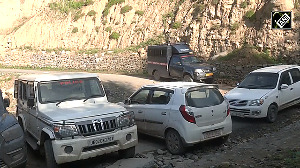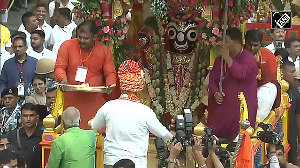The World Bank has suggested that cess on petrol and diesel be doubled to Rs 3 per litre to partly generate Rs 100,000 crore (Rs 1,000 billion) needed by 2011 for constructing roads and highways in the country.
"The fund thus generated should be dedicated for road maintenance. Also the purchase and ownership taxes, especially for buses and trucks, need to be streamlined," senior transport specialist of World Bank P Vickers said at a FICCI workshop on road transport sector in New Delhi on Friday.
Currently, Rs 1.50 a litre cess is levied on petrol and diesel, half of which goes to fund the National Highways Development Project and the remaining the rural and state roads.
Though there is a need to introduce more direct road user charges such as toll tax or weight-distance charge, he said, users are more likely to pay if there is an improved level of information on tax burden.
"Financial figures for road agencies should be shifted to accrual accounting and capitalising assets," senior transport planner of the Bank Alok Bansal said.
Pointing out that only a third of the road user taxes are returned to the sector as investment or maintenance, Bansal said the national highway financing structure in India is sub-optimal with no uniform tax structure.
Even though bus transport is an easy revenue source, the levels of charges appear neither equitable nor efficient, Vickers said, adding there is also very limited coordination between the policies of the Indian Railways and the rest of the transport sector.
On private partnership in the sector, he said more players could be attracted if a 'sound legislative, regulatory and institutional framework' is put in place.
Safeguarding of investors' interest in case of change of government policy and setting up of a autonomous regulatory body could be steps in attracting more private players in the sector, Vickers said.





